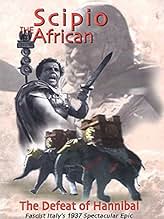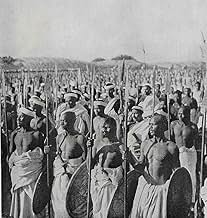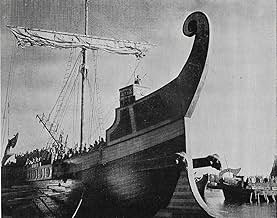CALIFICACIÓN DE IMDb
5.3/10
338
TU CALIFICACIÓN
Agrega una trama en tu idiomaA story of the Second Punic Wars, beginning with Scipio's futile pleas to the Roman Senate to build an army to battle Hannibal, that climaxes with the battle of Zama.A story of the Second Punic Wars, beginning with Scipio's futile pleas to the Roman Senate to build an army to battle Hannibal, that climaxes with the battle of Zama.A story of the Second Punic Wars, beginning with Scipio's futile pleas to the Roman Senate to build an army to battle Hannibal, that climaxes with the battle of Zama.
- Dirección
- Guionistas
- Elenco
- Premios
- 1 premio ganado en total
Opiniones destacadas
Pretty bad. Visually a mesh of Italian Futurist motifs and imitations of the Nazi "Triumph of the Will," with doses of peplum tossed in for good measure - but not the peplum of heroic action scenes (the action scenes in this movie - only two - are so poorly edited they are simply confusing) but that of the dull cloak-and-dagger intrigue subplots that drag down the lesser muscle-man films and Italian epics. Lotsa posturing and talk, talk talk. Some striking images, but they are all painfully static - the editing is atrocious.
The scenes with the elephants are painfully ugly, and just a reminder of the essential cruelty of the politics behind this film.
Produced by Vittorio Mussolini at the urging of his father 'Il Duce.' Some moments constitute effective propaganda, but that the film only played a week in Italy tells us that by the date of its release, Italians were getting tired of the same old lies.
And whatever the facts, thematic lies abound - the central premise of the film appears to be that, since an African nation had invaded Italy 2,000 years ago, this justified Italy invading another African nation (Ethiopia) in the 1930s - huh?! A grim reminder that Mussolini had slipped into some kind of fantasyland and was bent on bringing Italy down with him.
Looney, messy, arrogant, dull. Only for students of the history of Italian Fascism, or that of propaganda in general.
The scenes with the elephants are painfully ugly, and just a reminder of the essential cruelty of the politics behind this film.
Produced by Vittorio Mussolini at the urging of his father 'Il Duce.' Some moments constitute effective propaganda, but that the film only played a week in Italy tells us that by the date of its release, Italians were getting tired of the same old lies.
And whatever the facts, thematic lies abound - the central premise of the film appears to be that, since an African nation had invaded Italy 2,000 years ago, this justified Italy invading another African nation (Ethiopia) in the 1930s - huh?! A grim reminder that Mussolini had slipped into some kind of fantasyland and was bent on bringing Italy down with him.
Looney, messy, arrogant, dull. Only for students of the history of Italian Fascism, or that of propaganda in general.
Fascism stifles creativity.Both German and Italian cinemas of the 1935-1939 era could not produce one single masterpiece.Had they had an Eisenstein,there could have been an "Alexandre Nevski" ,a contemporary movie of Scipione.Both movies are propaganda movies,but it's hard to consider Gallone's movie a work of art.
"Scipione l'Africano" is some kind of breviary of the ideology of the Mussolini years:personality cult(Scipione's boldness against the senate's listlessness), a huge -and this is an euphemism - misogyny (Scipione's wife who briefly appears is relegated to the mother's role,baby in arms,par excellence the woman's raison d'être;on the other hand,the wicked queen Sofonisbe who dabbles in politics is even slagged of by her husband:"when she entered my life,wisdom walked away") and a blatant over-simplification:the Romans are noble,they treat their prisoners with great consideration while Hannibal and his clique are lecherous brutes.
Strangely,the movies leaves little room to anecdote:only a bland couple,both the cruel barbarians' prisoners is featured outside the historical characters.The actors 'playing recalls the silent movies,almost ten years after "the jazz singer"!The final scenes are admittedly spectacular but they have been dwarfed by the great epics of the late fifties/early sixties.
NB:"Cartagine in fiamme" (1960) by the same director is neither a sequel nor an improvement.
"Scipione l'Africano" is some kind of breviary of the ideology of the Mussolini years:personality cult(Scipione's boldness against the senate's listlessness), a huge -and this is an euphemism - misogyny (Scipione's wife who briefly appears is relegated to the mother's role,baby in arms,par excellence the woman's raison d'être;on the other hand,the wicked queen Sofonisbe who dabbles in politics is even slagged of by her husband:"when she entered my life,wisdom walked away") and a blatant over-simplification:the Romans are noble,they treat their prisoners with great consideration while Hannibal and his clique are lecherous brutes.
Strangely,the movies leaves little room to anecdote:only a bland couple,both the cruel barbarians' prisoners is featured outside the historical characters.The actors 'playing recalls the silent movies,almost ten years after "the jazz singer"!The final scenes are admittedly spectacular but they have been dwarfed by the great epics of the late fifties/early sixties.
NB:"Cartagine in fiamme" (1960) by the same director is neither a sequel nor an improvement.
In this movie we have more sympathy for Hannibal with one eye (Camillo Pilotto) than for Scipio (Annibale(!) Ninchi) because Hannibal has so much pathos. Mussolini said: "Il cinema é l'arma piu forte". This movie received his personal "Mussolini cup" award for best Italian film of 1937, but one doubts if today this movie would be regarded as a propaganda-movie. Scipio won his last battle against Hannibal indeed, but by hurting elephants in a cruel way. There is a scene where a Roman officer prohibits a Roman soldier to launch his spear at a baby-elephant who was in the battle with his mother. It is a horrible sight to see an elephant receiving a spear in his eye, or falling down after having a spear in his leg. The elephants are crying out their pain and despair and one feels more pithy for them than for the dying soldiers. Anyway, the tactics of Scipio made it possible to let the elephants go through the lines of the hastari (Roman infantry) so they could not crash the Romans. At one moment in the battle the Gallic soldiers of Carthago (Spain was occupied by Carthago) fall back but Hannibal doesn't want them to fly and they are killed by the Carthagenian spears. The politics in the movie are well explained: the Council of the Elder of Carthago falling on their knees to have Hannibal back and the Roman Senate which is very angry because the Carthagenians break the truce. Some historical persons are not very clear (Captain Massinissa, Queen Sophonisba, King Syphace) but for the Italians of that time who knew their national history, included the Roman history, they will have understood their importance. The dialogues are realistic and they show also the relevance of the fact that the Carthagenians had more a mercenary-army and the Romans more an army of civilians. But at the end, both generals, Scipio and Hannibal cry the same: "Rome or Carthago or dead!". For the Carthagenians their future was at stake. Carmine Gallone, the director, made in 1960 thus 23 years later, another movie about Carthago: "Cartagine in fiamme". Was this a sequel?
In 202 BC Publius Scipio inflicted a devastating defeat on Hannibal at Zama. This triumph has been used in this flagrantly propogandist film to justify Mussolini's invasion of Abyssinia. This expensively made 'epic' was not a success and we can safely assume that its influence on the average Italian cinema-goer was minimal.
Despite its jingoistic speeches and upraised Roman salutes this film, purely as a film, should not be entirely dismissed as there are some very effective scenes with marvellous images captured by cinematographers Ubaldo Urata and Anchise Brizzi. The score is by Ildebrando Pizzetti who contributed to the original score for Pastrone's 'Cabiria' in 1914!
Director Carmine Gallone's film career stretched from 1913 to 1962 and he keeps the momentum going here with powerful crowd scenes and some intimate dialogues involving Hannibal, Velia and Sophonisba. In fact Gallone's best directed scenes feature the tantalising Francesca Braggiotti as Sophonisba. This actress did very few films and when her husband John Lodge did the acting profession a great service by going into politics she became the First Lady of Connecticut. Our loss. Velia as played by luscious Isa Miranda is nobility incarnate and defiantly declares to Hannibal: 'Romans fear only the Gods'. If the character of Scipio is meant to mirror that of Il Duce it is very much an 'own goal' as the actor Annibale Ninchi is totally devoid of charisma. Ironically it is the character of Hannibal as played by Camillo Pilotti who is by far the most interesting and sympathetic. This cannot have been intentional surely?!
The last fifteen minutes is devoted to the Battle of Zama which depicts the gruesome brutality of hand-to-hand combat. The battle opens with the charge of Hannibal's trumpeting elephants. Should any animal rights activists be watching I would strongly recommend they take an opportunity at this point to make a cup of tea. As one critic has cleverly observed: 'What Scipio did to the elephants, Mussolini was to do to Italy!
Despite its jingoistic speeches and upraised Roman salutes this film, purely as a film, should not be entirely dismissed as there are some very effective scenes with marvellous images captured by cinematographers Ubaldo Urata and Anchise Brizzi. The score is by Ildebrando Pizzetti who contributed to the original score for Pastrone's 'Cabiria' in 1914!
Director Carmine Gallone's film career stretched from 1913 to 1962 and he keeps the momentum going here with powerful crowd scenes and some intimate dialogues involving Hannibal, Velia and Sophonisba. In fact Gallone's best directed scenes feature the tantalising Francesca Braggiotti as Sophonisba. This actress did very few films and when her husband John Lodge did the acting profession a great service by going into politics she became the First Lady of Connecticut. Our loss. Velia as played by luscious Isa Miranda is nobility incarnate and defiantly declares to Hannibal: 'Romans fear only the Gods'. If the character of Scipio is meant to mirror that of Il Duce it is very much an 'own goal' as the actor Annibale Ninchi is totally devoid of charisma. Ironically it is the character of Hannibal as played by Camillo Pilotti who is by far the most interesting and sympathetic. This cannot have been intentional surely?!
The last fifteen minutes is devoted to the Battle of Zama which depicts the gruesome brutality of hand-to-hand combat. The battle opens with the charge of Hannibal's trumpeting elephants. Should any animal rights activists be watching I would strongly recommend they take an opportunity at this point to make a cup of tea. As one critic has cleverly observed: 'What Scipio did to the elephants, Mussolini was to do to Italy!
A plodding historical epic depicting Rome's defeat of Hannibal at Carthage that was produced by then-Italian Dictator Benito Mussolini's son, and which is nothing more than a flagrant exercise in tactless propaganda. Although it's an extravagant production, there are an awful lot of money-saving shortcuts whereby characters describe the battles in which they've just participated.
¿Sabías que…?
- TriviaOne of the earliest known uses of the zoom lens.
- ErroresExtras wearing wristwatches, even though the film is set thousands of years before they were invented.
- ConexionesEdited into La case du siècle: Cinecittà, de Mussolini à la Dolce Vita (2021)
Selecciones populares
Inicia sesión para calificar y agrega a la lista de videos para obtener recomendaciones personalizadas
Detalles
- Fecha de lanzamiento
- País de origen
- Idioma
- También se conoce como
- Scipio Africanus: The Defeat of Hannibal
- Locaciones de filmación
- Productoras
- Ver más créditos de la compañía en IMDbPro
- Tiempo de ejecución
- 1h 57min(117 min)
- Color
- Mezcla de sonido
- Relación de aspecto
- 1.37 : 1
Contribuir a esta página
Sugiere una edición o agrega el contenido que falta

















